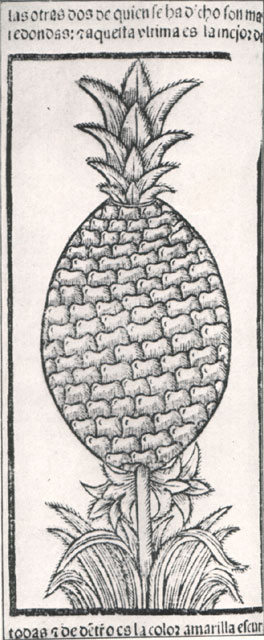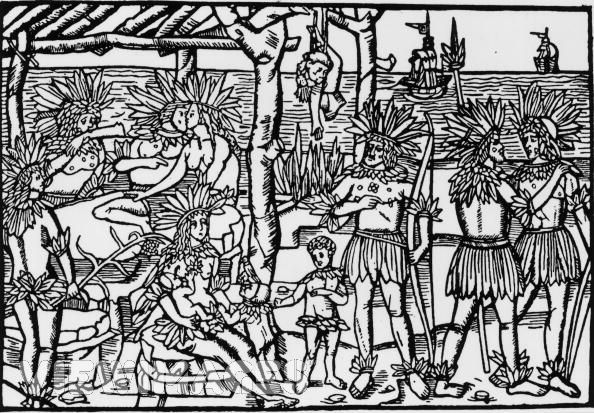Module Details
‘We are living in a New World today, and things are being done differently.’
(Martin Luther, 1524)

Gonzalo Fernández de Oviedo, ‘pineapple’, circa 1535
John Froschauer, ‘Americans', 1505
This special subject is co-taught by Rebecca Earle and Claudia Stein. Our offices are in rooms H327 (Rebecca) and H312 (Claudia), and our office hours are listed on the doors. You may also make an appointment to see either of us outside of office hours by contacting us via email on r.earle@warwick.ac.uk and claudia.stein@warwick.ac.uk, or by telephone on 024-76-523466 (Rebecca) or 024-765-23428 (Claudia).
Aims and Objectives
When Columbus and his crew arrived in the Caribbean in 1492 he unleashed a series of events that were literally world-changing. The European ‘discovery’ of the Americas led to the such disparate events as the Atlantic slave trade and the roast potato. It also posed a conceptual challenge to Amerindians and Europeans alike. European explorers such as Columbus were confronted with something of which they had no prior knowledge. A completely new world had to be incorporated into their cosmological, geographical, medical, botanical, zoological and anthropological understanding. ‘The ‘shock of the new’ was no less challenging for the many indigenous cultures the Europeans encountered in the Americas. Much like their European counterparts, they, too, tried to come to terms with the unknown by using categories and suppositions couched in and inherent to the mentalities of their own cultures. This special subject looks at the many ways in which this newness was recognized, confronted and explained by European and New World authors. We will follow the slow (and often painful) process of encountering the new, and explore the various attempts Europeans and Amerindians made to understand and interpret the unfamiliar.
This special subject, designed for final year students, is interdisciplinary in approach. It covers a wide range of research areas, including social and cultural history, economic history, colonial studies, literary studies, and art history, as well as history of medicine and the sciences. It employs a range of primary sources from both Europe and the Americas. It is the first module to combine the History department’s strength in the history of medicine and science with its longstanding focus on the history of the Americas. By examining the interactions between European and New World modes of understanding the module encourages students to cross geographical, disciplinary and conceptual boundaries.
Learning Outcomes
By the end of this module you will:
- better understand the reactions of both Europeans and Amerindians to the ‘discovery’ and colonisation of the Americas.
- appreciate the factors that shaped and determined these reactions.
- express yourself in written work with greater fluency and coherence.
- have improved your ability to assess and evaluate historical analysis and argument.
Teaching and Learning
This module is taught through weekly 2-hour seminars, which are held every Thursday from 9.00 to 11.00 in S.019 in term one, and in S.018 in terms 2 and 3. Seminars consist of class discussion based on the assigned reading. There are no lectures. You will be expected to complete the assigned seminar reading, and to write 2 unassessed essays of 2,000 words each. In addition, if you wish, you may complete an additional, unassessed mock exam paper.
Assessment
The assessment for this module is determined by whether or not the student will be basing a Dissertation on the module:
- For students who are not basing a Dissertation on this module: a two-hour exam and a 4,500 word essay
- For students who are basing a Dissertation on this module: a three-hour exam
For details of examination and assessment, please see: http://www2.warwick.ac.uk/fac/arts/history/undergraduate/assessment/
Deadlines
All assessed essays are due on the official deadlines announced by the History Department. The unassessed short essays/exams are due as follows:
- Essay 1: Friday of week 7, term 1
- Essay 2: Friday of week 7, term 2
- Mock Exam (if written): Friday of week 9, term 2
You are welcome to hand in your essays in advance of these deadlines.

